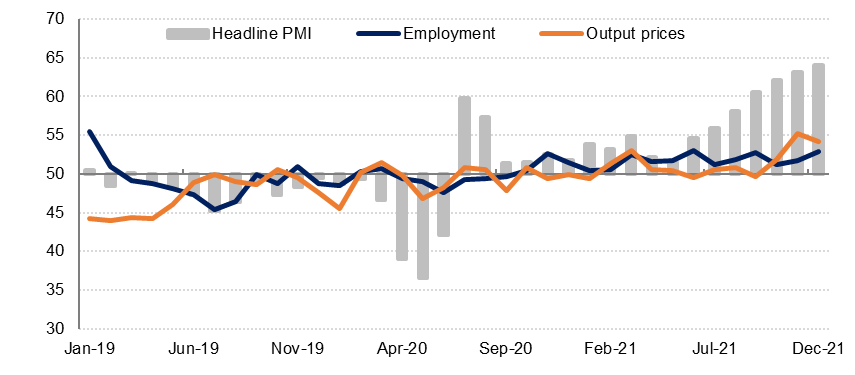
Qatar’s second wave of coronavirus cases appears to have peaked in mid April, as tighter restrictions on some services were reimposed, and the 7-day average of new cases has since declined to 803 (Our World in Data, 27 April) or 259 per million people. Qatari press reported that over half a million people in Qatar (around 17% of the population) were fully vaccinated by 26 April.
Qatar’s economy contracted -3.7% in 2020, slightly better than our -3.9% forecast. Hydrocarbons sector GDP declined -2.1% while the non-oil sectors contracted -4.6%. Transport, hospitality, construction, manufacturing, trade and professional services were all negatively impacted by the pandemic, but this was partially offset by growth in financial services, public administration, utilities, education and healthcare. Quarterly data show the economy expanded 5.5% q/q in Q3 and declined only fractionally at -0.5% q/q in Q4 2020.
PMI survey data point to a continued recovery in the non-oil private sector in Q1 2021, with the headline PMI averaging 54.0. The March reading of 54.9 was the highest since the series began iin 2017. Output and new work growth gained momentum in Q1 21 and the survey indicated some growth in private sector jobs, albeit modest. There was little evidence of price pressure in the pipeline, unlike other GCC PMI surveys. Input costs actually declined slightly in Q1 and firms raised selling prices slightly as demand recovered. However, firms were still cautious about the outlook over the next twelve months.
 Source: IHS Markit, Emirates NBD Research
Source: IHS Markit, Emirates NBD Research
This year we expect non-oil sectors to expand 4.0% as the country prepares to host the 2022 FIFA World Cup, and as activity and travel continue to normalize in H2 2021. We forecast headline GDP at 2.5% in 2021, rising to 4.3% in 2022.
In April, the cabinet approved a draft law that would allow up to 100% foreign ownership of listed companies in Qatar, with individual companies permitted to approve their own foreign ownership limits. This is the latest in a series of reforms aimed at boosting foreign investment and retaining talent. Last year, the authorities overhauled labour regulations to make it easier for workers to change jobs, and introduced a form of permanent residency including access to state education and healthcare for investors purchasing property worth more than USD 1mn.